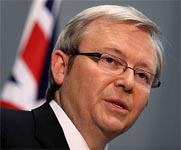Australians talk socks, jocks, polo shirts and protection
 Sydney - Australian Prime Minister Kevin Rudd had hoped that when the Group of 20 (G20) met in London in April, he would be among the few representing an economy still growing.
Sydney - Australian Prime Minister Kevin Rudd had hoped that when the Group of 20 (G20) met in London in April, he would be among the few representing an economy still growing.
But the billions spent in November's stimulus package won't stop a second consecutive quarter of shrinkage that would qualify the Australian economy as being in a technical recession.
"Australia can reduce the impact, cushion the impact of the global economic tide, but we can't stop it altogether," Rudd admitted. "There's no guarantee of success, but we'll throw everything at this."
Rudd came to office in December 2007 pledging more healthy surpluses in the national accounts. He's now resigned to taking the country deeply into debt.
The unions that helped the Labour leader into office now want him to abandon a commitment to free trade, just as he previously gave up on balanced budgets.
In Australia, as elsewhere, the clamour to safeguard jobs in stressed industries like manufacturing is strong. The difficulty for Rudd is that Canberra has always been a haven for free-trade zealots. Bowing to protectionist sentiment would be another backflip.
In the run-up to the G20 meeting, Canberra was quick to rail against the Buy American clause in the latest United States stimulus package.
Nevertheless, families who received cash handouts from Rudd in November were urged to go out and spend their money "on socks, jocks and polo shirts" - the leading local manufacturer of which is Australia's Pacific Brands Ltd.
That approach backfired when, three months later, Pacific Brands announced it was shutting its factories, with the loss of almost 2,000 jobs, and moving production offshore.
"I think what Pacific Brands has done is frankly, in so many respects, beyond the pale," Rudd said, noting that the company had received millions in subsidies.
Yet, a lot of this is bluster. Rudd faced down the unions and, speaking in Washington before his first meeting with US President Barack Obama, declared "protectionism helps spread the fire, it doesn't but the fire out."
Pacific Brands chief executive Sue Morphett said production would inevitably have shifted offshore - the current cash crisis just hastened that shift.
"It's a clear competitive disadvantage for us to be carrying on clothing manufacturing in Australia, unfortunately," Morphett said. "The alternative was to take a little bit here, a little bit over there, but I felt that was the worst way to do it. If there's going to be change that's going to impact on people, you need to be upfront and let them know.
What's true of underwear manufacturing is true of the car industry, says Oliver Hartwich, a research fellow at the Centre for Independent Studies in Sydney. He argues that protection is all that keeps production lines rolling.
"Australians will come to rue the day that Rudd decided to treat the car industry as an issue of systemic significance," Hartwich said.
Last year, Mitsubishi Motor Corporation closed its plant after taking an astonishing 28 years to build just 1.1 million cars.
"Government assistance to the auto industry will be another example of wasted taxpayer funds," said Newcastle University economist Michael Costa, who predicted that antiquated notions of national prestige are driving the car industry.
Rudd will have success stories to tell around the G20 table. There hasn't been a run on an Australian bank. In fact, of the 14 AA-rated banks around the world, four are in Australia.
Less than 1 per cent of mortgage holders are in difficulty with repayments and more than 90 per cent are paying off their loan faster than they need to.
Rudd has already rehearsed his London speech. It's self- congratulatory and an appeal for other governments to deal with the toxic debt that the lucky country avoided.
"Australians know we are coping with this downturn better than other countries, but our medium-term prospects depend on global efforts to deal with the cause of this emergency," Rudd said.
"That's why Australia will press so strongly for a clear plan of action in London," he said. (dpa)